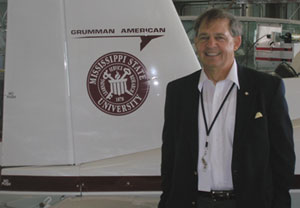MISSISSIPPI SPOTLIGHT
'Cognitive Dissonance' Scuttles Project
More important to the process than even incentives and logistics, says Lehner, is getting all the parties involved — from project finance players to economic development parties to utilities — to share a commitment to getting the project done. And much of that has to come from state and local officials.
Flight Lab Aids 'High-Tech Revolution'
The Raspet Flight Research Laboratory conducts research on composites, unmanned aerial vehicles and other aerospace initiatives for industry, saving companies significant research investments. The work is attracting top flight engineers and scientists from around the country. "I want to bring resources into the state that will contribute to the high-tech revolution in Mississippi," says David Lawrence, director of the laboratory. "We're developing infrastructure that will allow us to be a real economic development resource for the state." Raspet's largest current tenant is Aurora Flight Sciences, which develops composite materials for unmanned aerial vehicles. The company has outgrown its space at the incubator and is building a new facility. Evidence of an aerospace cluster is increasingly evident, such as local higher education's contribution. "East Mississippi Community College is working with us to set up a composite training course, which has never been offered locally," notes Steven Bacon, Aurora's general manager. "When a new company comes into the area, one of its concerns is the investment in training it will have to make. In our case, people will now be able to come to us with some of the skills we are looking for." Adding to the area's aerospace critical mass is American Eurocopter, which builds A-star helicopters at a new, 85,000-sq.-ft. (7,900-sq.-m.) facility in Columbus. |
"Your 10 primary constituencies all have to support the project and work to solve the myriad of issues that come up," he notes. One state SeverCorr negotiated with had what Lehner calls "cognitive dissonance between the state economic development people and legislators and county officials — they didn't have a cohesive economic development function. We could not unite all the stray dogs and cats."
Meanwhile, Mississippi was working with the Tennessee Valley Authority to certify the Golden Triangle mega-site, which is one of a relatively limited number of sites large enough to accommodate a steel plant site. SeverCorr needed 1,400 acres (567 hectares). One other site, in Kentucky, had also achieved certification, but the Mississippi site was preferable in terms of proximity to SeverCorr's market.
"Every state has to acknowledge what its competitive advantages are, and one of Mississippi's is its excellent business climate," says Lehner. "It's got good leadership when it comes to economic development. You have to have the laws on the books that allow you to attract major projects with a significant economic development impact, and if the legislature is not supportive of that, then it won't happen. In the case of this project, all of that was in place."


